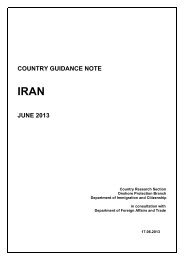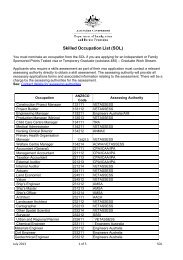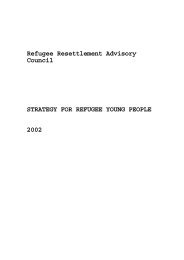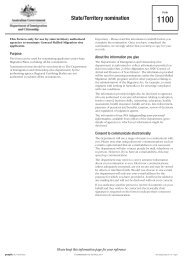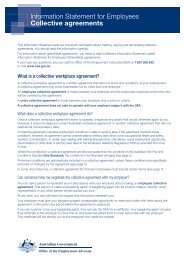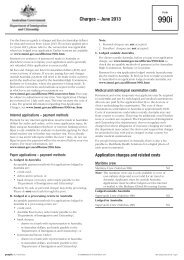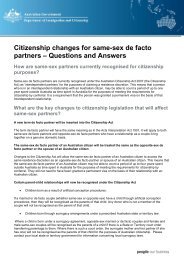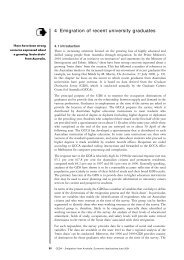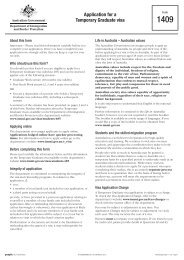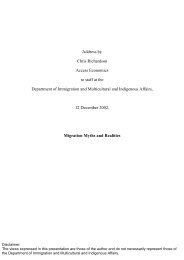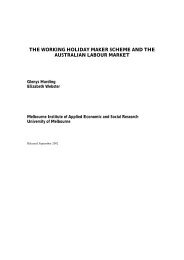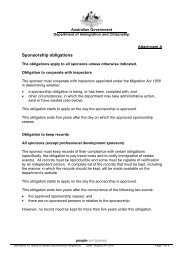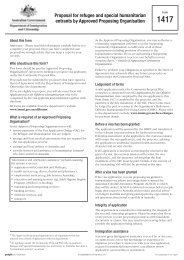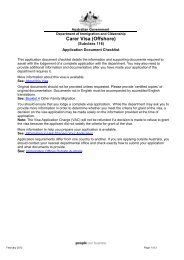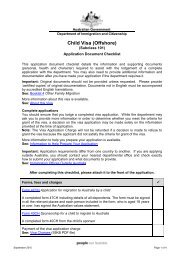Evaluation of the Integrated Humanitarian Settlement Strategy (IHSS)
Evaluation of the Integrated Humanitarian Settlement Strategy (IHSS)
Evaluation of the Integrated Humanitarian Settlement Strategy (IHSS)
Create successful ePaper yourself
Turn your PDF publications into a flip-book with our unique Google optimized e-Paper software.
identification <strong>of</strong> statistical, financial and o<strong>the</strong>r service data.<br />
A1.4 Finalisation <strong>of</strong> evaluation framework<br />
To finalise <strong>the</strong> evaluation framework <strong>the</strong> following steps were taken:<br />
Clarification and confirmation with <strong>the</strong> Departments about <strong>the</strong> research tasks, processes and<br />
protocols to be followed.<br />
Clarification with <strong>the</strong> Reference Groups about client recruitment.<br />
Defining <strong>the</strong> roles and responsibilities for <strong>the</strong> consultants and Departmental staff.<br />
Confirming <strong>the</strong> fieldwork locations and organisations to be visited.<br />
Finalising a timetable for <strong>the</strong> completion <strong>of</strong> key milestones.<br />
A1.5 <strong>Evaluation</strong> website<br />
The website content comprised an evaluation overview, <strong>the</strong> terms <strong>of</strong> reference, <strong>the</strong> methodology,<br />
links and information on making a submission (including <strong>the</strong> question guides). This content was<br />
similar to <strong>the</strong> information mailed out to service providers, volunteer groups and stakeholders.<br />
The website was functional from 4 th November 2002.<br />
Urbis Keys Young received numerous inquiries regarding <strong>the</strong> evaluation and a total <strong>of</strong> 30 written<br />
submissions were received (12 responses from CSR groups, 7 responses from service providers and<br />
11 o<strong>the</strong>r stakeholder responses).<br />
A1.6 Fieldwork<br />
Twelve locations were identified in which to conduct fieldwork. These were spread across Australia<br />
and provided a suitable balance <strong>of</strong> regional and metropolitan areas:<br />
<br />
Sydney (NSW)<br />
<br />
Adelaide (SA)<br />
Canberra, Wagga Wagga 3 (ACT)<br />
<br />
Perth (WA)<br />
<br />
Hobart, Launceston (Tas)<br />
<br />
Darwin (NT)<br />
<br />
Melbourne (Vic)<br />
<br />
Brisbane, Cairns, Toowoomba (Qld)<br />
The fieldwork was undertaken during November 2002 by four Urbis Keys Young researchers.<br />
A clear procedure was developed for recruiting, liasing with and interviewing members <strong>of</strong> each <strong>of</strong><br />
<strong>the</strong>se groups. This is described below.<br />
3<br />
Although Wagga Wagga is in NSW it is included in <strong>the</strong> ACT region and serviced from <strong>the</strong> ACT.<br />
A2<br />
<strong>Evaluation</strong> <strong>of</strong> <strong>the</strong> <strong>Integrated</strong> <strong>Humanitarian</strong> <strong>Settlement</strong> <strong>Strategy</strong> 27 May 2003



